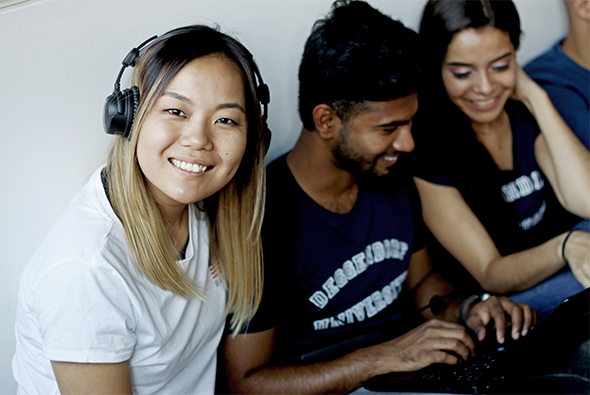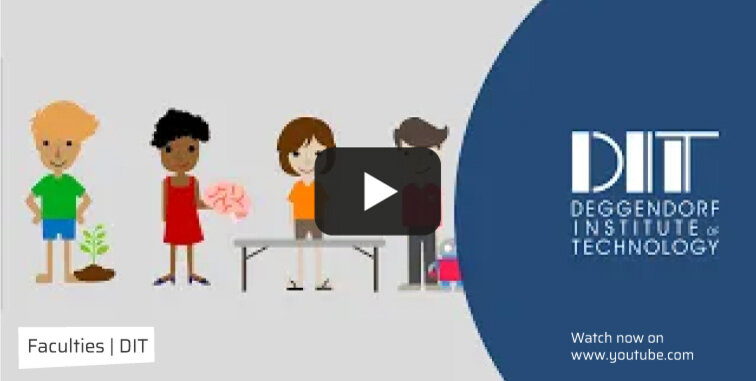your dream study programme is waiting for you
apply now at bavaria's most international university
Welcome to our award-winning university where staff and students boldly develop, study, research, teach and innovate. We are a place of endless opportunities and personal stories, created by each individual member of our inspirational university community. Discover our world and let us inspire you, too!
about dit
#count students.
information for potential students
a place to work, teach & research
information for businesses
Starting a business, innovation & transformation
dit stories
events
news
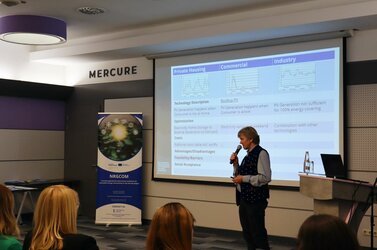
On Tuesday, 23 April, the first national workshop of the Interreg Danube Region project "NRGCOM" took place. It was organised and hosted by the Deggendorf Institute of Technology (DIT) as a partner in the project. The focus was on Energy Communities and how they can best develop in the region.
The NRGCOM project was launched in January and aims to create an environment in which renewable energy communities can flourish in the Danube region. This aim was also addressed by the workshop on 23 April. After the project presentation by Agnes Frank, DIT’s project manager, Prof. Dr. Raimund Brotsack together with Dr. Robert Bauer introduced the topic. A number of examples of good practice from Fuchstal, from the regional power plant in Cham and from the association Bayerische Bürgerenergie were presented. The participating energy communities and local action groups then discussed potential cost-effective infrastructure solutions and technological developments, as well as how the issue will develop in the future. For the participants, the workshop laid the foundation for cooperation with DIT as a partner in the "NRGCOM" project. In the further course of the project, legal solutions will be researched, operating models analysed and a model for creating favourable conditions for energy communities will be developed. The foundations laid at the first national workshop held by the DIT will be further developed on 3 June. This next workshop on business and governance models of energy communities will take place at the European Campus Rottal-Inn.
The national workshop was preceded by a kick-off event. It took place from 12 to 14 March in Budapest and brought together all 13 project partners from a total of 12 countries. The Interreg Danube Region project "NRGCOM" is led by the South Transdanubian Regional Innovation Agency. The overall objective of NRGCOM is to promote energy communities in the Danube region by creating an environment in which community renewable energy initiatives can develop to facilitate the energy transition and increase energy efficiency.
The project runs from 1 January 2024 to 30 June 2026 and is funded by the Interreg Danube Region Programme, co-funded by the EU. In total, there are 13 project partners and 14 associated strategic partners from 12 countries. They will review the (legal) framework conditions, analyse business models and governance techniques, collect best practices and solutions and develop policy recommendations. The aim is to raise awareness of the concept and increase its dissemination in the partner countries through awareness-raising activities. It will also propose legal solutions, analyse operational models and provide training.
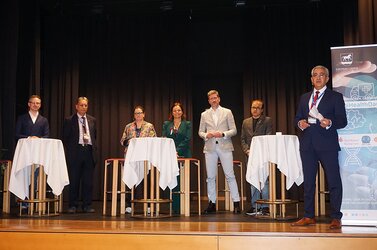
On 9 and 10 November, the fourth DigiHealthDay (DHD) was hosted by the European Campus Rottal-Inn (ECRI). The international scientific symposium received an impressive 1,323 registrations from 105 nations and brought together more than 450 people on-site and online. Academics, students, policy makers, company representatives and digital health enthusiasts came together to discuss the future of technology use in healthcare. The amount of positive feedback marks the DHD as a leading platform for digital health research, education and networking.
Three plenary sessions, three online sessions, fifteen keynote speeches and one panel discussion: the event’s programme – this year focusing on ethics and regulations, innovation, entrepreneurship, and AI research – gave the DigiHealth community a platform to exchange ideas, discuss challenges and spark future collaborations. It was a rare opportunity for on-site attendees whose level of expertise ranged from academic backgrounds to simple interest, to engage directly with some of the world's foremost experts on digital health. International speakers included Dipak Kalra, PhD (United Kingdom), Rajendra Gupta, PhD (India), Anne Snowdon of HIMSS Analytics, PhD (Canada), Miklós Szócska, PhD (Hungary) and Lars Lindsköld, MD (Sweden), to name but a few.
The DHD was particularly impactful for Digital Health students and young professionals, like Ali Badran, Bachelor of Health Informatics at DIT, who says that “[DHD 2023] was a fantastic opportunity to exchange ideas, learn from others, and build connections that will undoubtedly contribute to [his] future endeavors.”
In turn, the speakers and guests were highly impressed by the youthful, diverse and inspiring nature of the DigiHealth family in Pfarrkirchen. “My head is still buzzing from the conversations and great insights shared during the DHD. The energy of the students was contagious, and it makes me very optimistic about the future of digital health”, remarked one of the speakers, Pilar Fernandez Hermida (United Kingdom & United Arab Emirates).
Planning is already underway for the five-year anniversary conference taking place from 4 to 8 November 2024. The DigiHealthDay – initiated by Georgi Chaltikyan, MD, PhD in 2019 – is part of the ECRI’s committment to further research, education and innovation in digital health.
---
More information on DigiHealthDay at https://www.th-deg.de/digihealthday
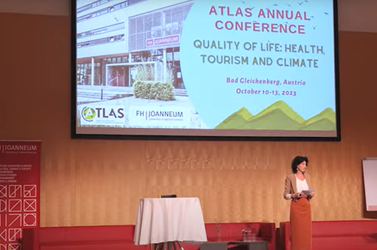
From 11 to 13 October, the international annual ATLAS conference took place in Bad Gleichenberg, Austria, hosted by FH JOANNEUM. Researchers Veronika Jánová and Linn Albert from the European Campus Rottal-Inn (ECRI) presented two projects.
The theme of the conference was "Quality of Life: Health, Tourism and Climate" and offered a multi-perspective view of tourism and a variety of current challenges. In the special track "Quality of Life, Well-Being, Climate Change: Bridging the Theory-Action Gap", Veronika Jánová presented the Interreg Alpine project BeyondSnow. The project is led by Prof. Dr. Marcus Herntrei and aims to increase the socio-ecological climate resilience of small snow tourism destinations and communities at medium altitudes in order to maintain their attractiveness for residents and tourists. In ten pilot regions in the Alps, adaptation strategies to climate change are being developed with the broad participation of local service providers. For the first time, a digital tool is being used to provide data-based solutions and concrete proposals to enable Alpine tourism regions to adapt and revitalise their tourism offer in the face of ecological change. The Resilience Decision Making Digital Tool will generate recommendations for the transition to sustainable tourism models and help preserve valuable regional resources.
As part of the special track "Good Practice in Learning and Teaching Tourism in Higher Education", Linn Albert presented the media and didactic oriented project XtraveL. Led by Prof. Dr. Sascha Kreiskott, the XtraveL team is developing an innovative and transferable teaching module that focuses on practical and theoretical skills for sustainable travel planning and hybrid excursions in higher education. Individual elements can be used by different stakeholders in higher education for planning trips, documenting events or trips, or for teaching and learning practical and future relevant skills.
This year's ATLAS Annual Conference was hybrid for the first time and offered a total of seven special tracks consisting of scientific presentations, simulation games and workshops. Circular Economy in Tourism and Hospitality, Cultural Routes, Sustainable Transport in Rural Areas, Urban Tourism and Well-being, Quality of Life and Climate Change, Good Practice in Learning and Teaching Tourism in Higher Education and Event Crisis Management were discussed intensively by participants from more than 20 countries.
The Association for Tourism and Leisure Education and Research (ATLAS) is a membership-based network and research organisation. Its main objective is to promote tourism and leisure education and research through regular meetings and exchange of information between member institutions.


